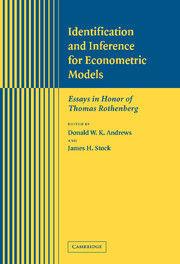Book contents
- Frontmatter
- Contents
- List of Contributors
- Preface
- Part I Identification and Efficient Estimation
- Part II Asymptotic Approximations
- 8 Asymptotic Expansions for Some Semiparametric Program Evaluation Estimators
- 9 Higher-order Improvements of the Parametric Bootstrap for Markov Processes
- 10 The Performance of Empirical Likelihood and Its Generalizations
- 11 Asymptotic Bias for GMM and GEL Estimators with Estimated Nuisance Parameters
- 12 Empirical Evidence Concerning the Finite Sample Performance of EL-type Structural Equation Estimation and Inference Methods
- 13 How Accurate is the Asymptotic Approximation to the Distribution of Realised Variance?
- 14 Testing the Semiparametric Box–Cox Model with the Bootstrap
- Part III Inference Involving Potentially Nonstationary Time Series
- Part IV Nonparametric and Semiparametric Inference
12 - Empirical Evidence Concerning the Finite Sample Performance of EL-type Structural Equation Estimation and Inference Methods
Published online by Cambridge University Press: 24 February 2010
- Frontmatter
- Contents
- List of Contributors
- Preface
- Part I Identification and Efficient Estimation
- Part II Asymptotic Approximations
- 8 Asymptotic Expansions for Some Semiparametric Program Evaluation Estimators
- 9 Higher-order Improvements of the Parametric Bootstrap for Markov Processes
- 10 The Performance of Empirical Likelihood and Its Generalizations
- 11 Asymptotic Bias for GMM and GEL Estimators with Estimated Nuisance Parameters
- 12 Empirical Evidence Concerning the Finite Sample Performance of EL-type Structural Equation Estimation and Inference Methods
- 13 How Accurate is the Asymptotic Approximation to the Distribution of Realised Variance?
- 14 Testing the Semiparametric Box–Cox Model with the Bootstrap
- Part III Inference Involving Potentially Nonstationary Time Series
- Part IV Nonparametric and Semiparametric Inference
Summary
ABSTRACT
This paper presents empirical evidence concerning the finite sample performance of conventional and generalized empirical likelihood–type estimators that utilize instruments in the context of linear structural models characterized by endogenous explanatory variables. There are suggestions in the literature that traditional and nontraditional asymptotically efficient estimators based on moment equations may, for the relatively small sample sizes usually encountered in econometric practice, have relatively large biases and/or variances and provide an inadequate basis for estimation and inference. Given this uncertainty we use a range of data sampling processes and Monte Carlo sampling procedures to accumulate finite sample empirical evidence concerning these questions for a family of generalized empirical likelihood–type estimators in comparison to conventional 2SLS and GMM estimators. Solutions to EL-type empirical moment-constrained optimization problems present formidable numerical challenges. We identify effective optimization algorithms for meeting these challenges.
INTRODUCTION
It is known in the literature that a number of moment-based estimators for the linear structural model are asymptotically normally distributed and mutually asymptotically equivalent. There is also a growing body of evidence (see, for example, Newey and Smith 2004 and the references therein) that traditional asymptotically efficient moment-based estimators may exhibit large biases and/or variances when applied to the relatively small samples usually encountered in applied economic research.
Econometric models that specify a set of moment-orthogonality conditions relating to the underlying data sampling process, and involving parameters, data outcomes, and model noise, lead to a corresponding set of unbiased empirical estimating functions. These estimating functions often involve instrumental variables (IV), whose number exceeds the number of unknown parameters of interest and overdetermines the model parameters.
- Type
- Chapter
- Information
- Identification and Inference for Econometric ModelsEssays in Honor of Thomas Rothenberg, pp. 282 - 305Publisher: Cambridge University PressPrint publication year: 2005
- 8
- Cited by



